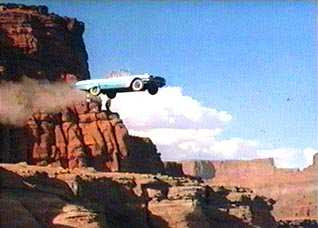Shin Sang-ok and Choi Eun-hee. Paid prisoners of Kim Jong-il for four years after four previous years of starved imprisonment after separate, violent kidnappings. No communication with the outside world. No freedom to travel or do anything not directly related to staying alive and making movies for the benefit of the North Korean military-state. Over the eight years, the couple was given millions of dollars and attempted suicides.
In 1986, after the “success” of “Pulgasari,” Shin suggested that the next film be a retelling of Ghengis Khan’s life. Kim jumped at the idea and agreed that this would be North Korea’s breakout film. Shin and Choi were sent to Vienna, Austria to meet with a European distributor, under the “protection” of North Korean armed guards, of course. Before meeting with the distributor (who only may have ever existed), Shin and Choi got lunch with an old friend, a Japanese film critic who had heard of “Pulgasari” and, more importantly, his friends’ shoot-on-sight tail. This Japanese man has since been referred to as “K” in official government correspondences, foreshadowing some serious shit went down.

Pictured above: (another?) government official referred to as "K"; not Japanese.
And went down it did. During their lunch, “K” sneaked the couple out of the restaurant and the three of them got into a taxi—it’s unknown if this was a taxi-driver’s dream-come-true or if “K” just went ahead and hot-wired the ride. We’ll go with “hot-wiring” because the three of them raced through the streets of Vienna, that were inches wider than the car, with the North Koreans chasing in pursuit. Considering “K” was a film critic and the other two were a married couple, the equivalent scene in “The Bourne Identity” is actually a water-down version of this real life chase scene.
Eventually, “K” Tokyo-Drifted his way to within a foot of the U.S. embassy and everybody got out and pled for asylum, having it granted at least quick enough. It can also be assumed the North Koreans growled from across the streets with the driver slamming his hands on the steering wheel of the taxicab they ACTUALLY STOLE. Or perhaps the North Koreans simply crashed their cab in the most cinematic way possible at some point towards the end of the race. Also, do you think there were any Austrian police cars involved? Because I think so.
For reasons defying logical explanation, Shin and Choi were not immediately embraced by their home country of South Korea and instead stayed in America for some time. The South Korean government was skeptical why it had taken the couple eight years to escape and why they had accepted payment for making movies in North Korea. Furthermore, they would not allow Shin to show the movies he had made (and smuggled with him through Vienna?), because they MIGHT display the cinematic prowess of North Korea.
America, to our own end, has spent decades deciphering and hypothesizing the thought process, mental capacity and overall sanity of Kim Jong-il. In most regards, it seems this man was, and is, a paradox of power. More so than in any other recent example, Kim was dependent on his prisoners. He was so adamant that North Korea’s failing was in logistics, not message, that he was willing to sacrifice (or at least risk) the purity of his message. Notably, he did not kidnap European, American or even Japanese filmmakers, but rather South Koreans; indicating that perhaps Kim sees Koreans as one people and that the South Koreans are not so much “enemies of the state” as they are innocent Koreans who have been led astray by capitalism and/or democracy.
At no point is Kim’s insanity predictable, though, as in response to the escape of Shin and Choi, North Korea claimed the couple were con artists who embezzled $2.3 million out of the government. And, afraid that the story had a few holes in it, North Korea issued another statement claiming that the couple voluntarily worked for Kim but were kidnapped by Americans while in Vienna.
Continuity the baffling international relations, when the Japanese film-going audience heard about “Pulgasari,” they begged Kim Jong-il to release the film beyond his borders. Despite his archival-knowledge, Kim had not heard of “camp” films (Mystery Science Theater 3000 and the like) and eventually gave in to international cinema pressure in the late nineties. The film was received on par with a plague of locusts in some circles and snickering riots in other circles. Had the monster movie, released in 1998, been received any worse, it would have starred Matthew Broderick. (Boom!) Kim then, essentially, screamed that only people who liked the movie are invited to his birthday party. Jeez, the guy handled criticism worse than Kevin Smith. (Boom! Two in a row!)
To this day, North Korea’s film industry still pumps out about 60 films a year but it is very unclear what the movies are about, who is making them and what they are like—as Western culture is still non-existent outside of Kim’s palaces. Kim, to his credit, now says cartoons are his favorite movies.
So, uh, word of advice to my animation friends: don’t pursue job offers that take you to Hong Kong.







